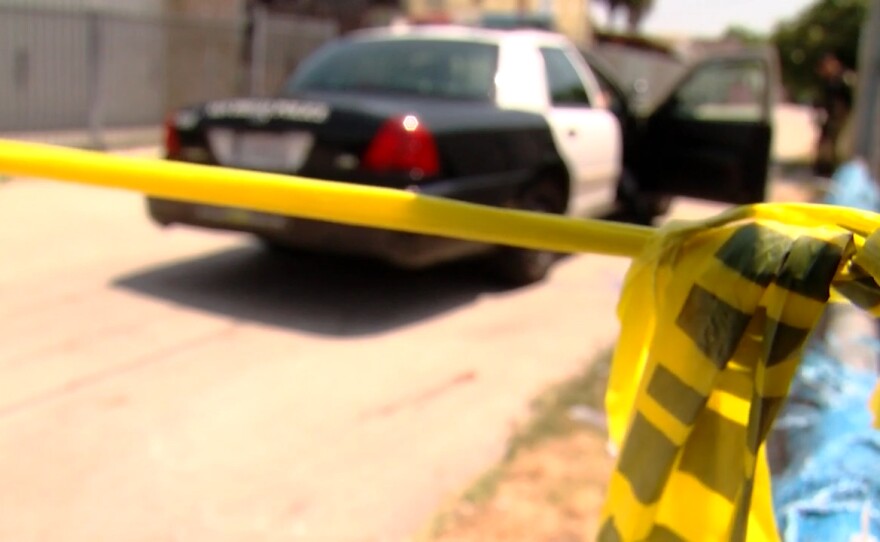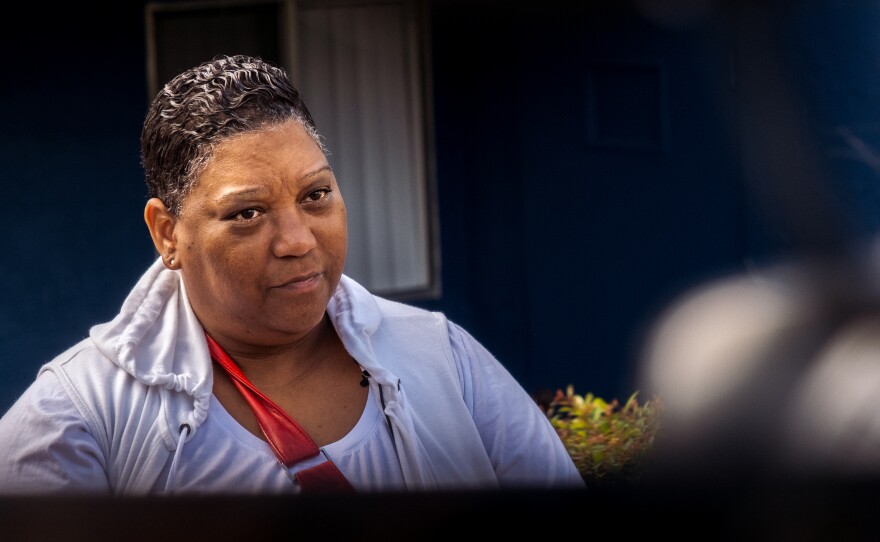This is the third part of a three-part series on police misconduct. Read part one here and part two here.
In August 2019, San Diego Police Detective James Needham handed off a shooting victim to federal immigration authorities. Needham was supposed to be investigating the shooting, but in the weeks that followed, he stopped looking into the case and repeatedly lied about his work, according to a police Internal Affairs report.
Needham’s behavior violated several police department policies, the report states. His actions also appear to be illegal under California law, which limits police’s cooperation with federal immigration agents.
According to police department rules, Needham should have been terminated for untruthfulness. But instead, he retired 13 days after Internal Affairs completed its investigation, and before he was formally disciplined.
Needham’s case highlights the limitations of a recent law designed to increase transparency among California police departments. SB 16, which went into effect last year, makes several categories of police misconduct records public, but it doesn’t prevent officers from resigning before they are disciplined.
“The bill doesn’t force an agency to take disciplinary action,” said State Sen. Nancy Skinner, who wrote SB 16. “But it certainly allows the public to say, ‘Why are you keeping this person now that we have the record?’”
The law does seek to prevent officers who’ve committed misconduct from leaving one department and moving to another. It requires police agencies to review an officer’s history of discipline and misconduct before hiring them. Skinner said this should prevent problematic officers from moving on to different agencies.
“The police chiefs really wanted that,” Skinner said. “Because the police chiefs didn't like the fact that there were bad apples who were just moving around between forces and they weren't knowing what this person's history was.”
But that doesn’t stop what’s happened in the past.
A joint inewsource and KPBS investigation found at least two San Diego police officers who had misconduct files went on to get jobs at the San Diego Sheriff’s Department and El Cajon Police Department. Their records did not include any information on whether the officers were disciplined.
Of the more than 90 cases of officer misconduct released by SDPD, about a third are missing disciplinary records. Seven of the officers in cases without disciplinary records, including Needham, left the force within one year of the wrongdoing or resigned before they were formally disciplined.
San Diego Police Capt. Jeff Jordon, who oversees police records, would not comment on specific employees, but said it’s “not uncommon” for officers to leave after an Internal Affairs investigation.
“To be clear, I cannot compel officers to remain employed with the San Diego Police Department throughout the disciplinary process,” he said.
Needham could not be reached for comment.

Working with ICE
During Needham’s investigation of the shooting, he became convinced the victim faked the crime to avoid deportation, the Internal Affairs report says. His belief led him to lie multiple times and fail to take basic steps to find the shooter.
It started when the victim reported that he was shot in the hand while cycling in a local park near Escondido and said his bike was stolen by the attacker.
Needham, who is white, visited the victim’s house for an interview and was stopped on the street by U.S. Immigration and Customs Enforcement, or ICE. The federal agents said they were monitoring the man and wanted to arrest him.
Needham told Internal Affairs that the agents were looking into the man for drug trafficking, but records don’t back up his statement. An ICE supervisor said later they wanted the man for illegal re-entry into the U.S.
According to the internal police files, ICE told Needham that undocumented immigrants fabricate crimes “all the time” in order to obtain special visas.
Needham agreed to work with the federal officers, which is against San Diego Police Department policy and state law. SB 54 prevents local police from cooperating with ICE to enforce federal immigration laws.

Needham went to the victim’s office for a “follow up” conversation on the shooting, police records show. When he arrived, he asked the victim a few questions and told him to put his wounded hand “over his heart as though he was doing the pledge of allegiance.” He took a picture of the man, left the building and sent the photo to federal agents.
Soon after, ICE officers walked in and arrested the man.
At first, Needham’s behavior was not flagged by the San Diego Police Department. It wasn’t until he told this story to a Deputy District Attorney who was looking into the victim’s deportation case that he got in trouble. The employee said her “stomach dropped” and she was “incredulous” of Needham’s behavior, according to police records.
She also found it difficult to believe the shooting was faked, because the victim was on a public bike path when he was attacked. But Needham refused to continue investigating the incident. Records show he did not interview witnesses and declined to have bullet casings analyzed.
“Detective Needham’s personal bias about this case affected the choice to ignore basic and fundamental investigative practices,” the internal report states.
Internal Affairs investigators also found Needham lied about the case several times. He told the District Attorney’s office there was no body camera footage of the shooting, which was not true. He told his supervisor that he didn’t know which federal agents he was working with after he admitted to the DA’s office that he was working with ICE. He also initially said he was “hot stopped” by the federal officers, meaning their guns were drawn when they approached him, which was incorrect.
The attorney for the shooting victim said the victim was eventually deported. Nobody was ever prosecuted for the shooting, according to the District Attorney’s office.

More changes to be made
Sharmaine Moseley, the interim executive director for San Diego’s Commission on Police Practices, said while transparency laws help the public, more needs to be done to stop behavior like Needham’s. She said the commission wants allegations of untruthfulness to be classified as the most severe category of complaint.
“If you're looking at a case file and you see untruthfulness throughout the entire case file, that's problematic because then that brings into question, how many times has the officer been untruthful in the past?” Moseley said.
Needham was the most senior detective at his command when he was found to be untruthful, police records show. He told investigators he had worked thousands of cases in his 12 years as a detective.
The records don’t mention if investigators probed Needham’s prior cases for signs of dishonesty.
Journalists, lawyers and open government advocates are also pushing for police agencies to strictly adhere to the new transparency laws.
First Amendment attorney Matthew Halgren successfully represented KPBS and other media outlets in a lawsuit requiring local police departments to release their records. But he said that doesn’t mean all records will be available for disclosure.
“SB 16 only went into effect last year,” said Halgren, who represents both inewsource and KPBS on legal issues as an attorney at Sheppard Mullin. “And so if a record was destroyed before it went into effect, then it may just be lost to time.”
For example, the San Diego Police Department’s disciplinary manual says some types of discipline can be removed from an employee’s file. Written warnings are sealed after one year and destroyed after two, the manual states.
But under SB 16, records relating to sustained findings of misconduct now must be kept for at least 15 years. Jordon with SDPD said the department is currently updating its manual to reflect changes in law.
Community advocate Tasha Williamson said trying to hold police accountable is very difficult, especially when departments are not transparent about their internal investigations.
She said she doubted the department would have missing documents in arrest files for civilians and said she has had trouble getting access to police misconduct records.
“It’s one hurdle after another,” she said. “You often find that it’s so very difficult to fight such giants. Giants who want to have the world assume that they are great and honorable. But not all of them are.”








